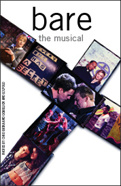Director Stafford Arima on Coming Out, Discovering Theater & Bringing Bare to a New Audience
About the author:
Canadian-born director Stafford Arima first made a splash across the pond, helming the Olivier-winning West End production of Ragtime. Arima headed to New York to direct the hilarious off-Broadway hit Altar Boyz before going west to helm Allegiance at San Francisco’s Old Globe. Last season, Arima brought a revamped version of the infamous Broadway flop Carrie back to the New York stage, and now he’s updating another youth-oriented musical for a brand new audience: Bare, starring Taylor Trensch, Jason Hite and Elizabeth Judd as Catholic school students caught in a forbidden love triangle. Below, Arima recounts the first time he fell in love with a musical, coming out as a gay man, and the rebirth of Bare at off-Broadway’s New World Stages.
![]()
In 1980, I came out as a huge fan of the art form we call the musical. I remember sitting in a darkened room with an audience of strangers experiencing Harold Prince’s production of Evita in Los Angeles. I was 11 years old and this happening changed my life. I turned to my mother at intermission and said three words, “I. Love. This!” 15 years later, I had a different coming out, but this time it was more difficult to say. I said another three words, “I. Am. Gay.” Those two coming outs had an impact on me as an artist and as a man, and have forever changed my life. Seventeen years later, I am sitting in theater number four, at New World Stages, celebrating with my colleagues, the “coming out” of the new musical, Bare.
In 2008, I was approached by the producers of Bare and asked if I wanted to meet the show’s librettist and lyricist, Jon Hartmere. I jumped at the chance. What followed was a four-year process of questions, debates, discussions and an exploration of possibilities that has continued throughout development, rehearsals, tech and previews.
Jon was interested in re-exploring every word in his script as well as every character in Bare. I said to him, “Go for it!” Jon was exuberant. Since nothing was sacred or precious, he began his journey in finding Bare’s voice for today’s world. The characters are grappling with issues that reflect the struggle society is engaged in at this very moment. In a world filled with conflicting philosophies, in which sexuality, religion, politics and technology are intertwined, and in some instances have been corrupted, theater is more vital than ever. Bare looks deep inside the human psyche and exposes its light and its darkness.
The story deals with issues of oppression, repression and suppression. It shows how tragedy occurs when people turn their backs on each other’s differences, how we are all participants, on some level, in the narrative of contempt, and how the human spirit can be transformed if, and when, one embraces forgiveness. I truly believe that’s why we are here today, revitalizing Bare—to help in the message of forgiveness. Theater can heal, and can shed a bright light on a love story that heals.
Recently, I was listening to a song recorded by Barbra Streisand. I couldn’t help but think about Bare in listening to these beautiful lyrics by Bernard Ighner:
Everything must change
Nothing stays the same
Everyone must change
No one stays the same
The young become the old
And mysteries do unfold
Cause that's the way of time
Nothing and no one goes unchanged
All of us, I think, look back over the events of our lives and marvel at the change that has occurred within our existence. So much has transformed in our world since Kristin Hanggi’s invigorating Los Angeles production of Bare burst on the scene over a decade ago—technology has revolutionized the way we communicate (in good and bad ways); we are still in a global debate about faith and its relationship in our lives (and our politics); and we have seen more tolerance in the world when it comes to embracing the differences that exist amongst us.
When Bare began previews last month, I couldn’t help but think of all the young people who were seeing their very first musical, and who were perhaps seeing themselves on a stage for the very first time. I think of the adults who may have forgotten the blessings of love, or where words can take us, or how healing it is to forgive. Through Bare, we can unlock some tightly bound closets by creating a dialogue within the various communities about that unadulterated, and often misunderstood, four-letter word—LOVE.
The characters in Bare are us—the universal us—human beings just wanting to know their place in the world, to know they are loved and accepted, to find connection with another, with a higher power, and most importantly, with themselves.
